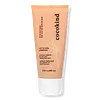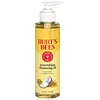What's inside
What's inside
 Key Ingredients
Key Ingredients

 Benefits
Benefits

 Concerns
Concerns

 Ingredients Side-by-side
Ingredients Side-by-side

Helianthus Annuus Seed Oil
EmollientGlycerin
HumectantVitis Vinifera Seed Oil
EmollientWater
Skin ConditioningSucrose Laurate
EmollientAvena Sativa Kernel Oil
Skin ConditioningAdansonia Digitata Seed Oil
EmollientSucrose Stearate
EmollientTocopherol
AntioxidantPelargonium Graveolens Flower Oil
MaskingSucrose Palmitate
EmollientAnthemis Nobilis Flower Oil
MaskingAvena Sativa Kernel Extract
AbrasiveLactobacillus Ferment
Skin ConditioningHelianthus Annuus Seed Oil, Glycerin, Vitis Vinifera Seed Oil, Water, Sucrose Laurate, Avena Sativa Kernel Oil, Adansonia Digitata Seed Oil, Sucrose Stearate, Tocopherol, Pelargonium Graveolens Flower Oil, Sucrose Palmitate, Anthemis Nobilis Flower Oil, Avena Sativa Kernel Extract, Lactobacillus Ferment
 Reviews
Reviews

Ingredients Explained
These ingredients are found in both products.
Ingredients higher up in an ingredient list are typically present in a larger amount.
Helianthus Annuus Seed Oil is the oil derived from the seeds of a Sunflower. Sunflower seed oil is non-fragrant. It is an emollient, meaning it helps to soften the skin.
Sunflower seed oil contains many fatty acids. The fatty acids found in sunflower seeds include (from highest amount to least): linoleic acid, myristic acid, palmitic acid, stearic acid, arachidic acid, oleic acid, and linolenic acid.
These fatty acids help the skin create ceramides. Ceramides play a role in repairing the skin barrier.
Helianthus Annuus Seed Oil helps moisturize the skin. This in turn helps the skin look more rejuvenated and smoother.
Sunflowers are rich in vitamin E.
Historians believe Indigenous cultures of North America domesticated sunflowers before corn. Thus they relied on sunflower oil for a variety of uses. One such use is moisturizing skin and hair.
Sunflower seed oil may not be fungal acne safe. We recommend speaking with a professional if you have any concerns.
Learn more about Helianthus Annuus Seed OilTocopherol (also known as Vitamin E) is a common antioxidant used to help protect the skin from free-radicals and strengthen the skin barrier. It's also fat soluble - this means our skin is great at absorbing it.
Vitamin E also helps keep your natural skin lipids healthy. Your lipid skin barrier naturally consists of lipids, ceramides, and fatty acids. Vitamin E offers extra protection for your skin’s lipid barrier, keeping your skin healthy and nourished.
Another benefit is a bit of UV protection. Vitamin E helps reduce the damage caused by UVB rays. (It should not replace your sunscreen). Combining it with Vitamin C can decrease sunburned cells and hyperpigmentation after UV exposure.
You might have noticed Vitamin E + C often paired together. This is because it is great at stabilizing Vitamin C. Using the two together helps increase the effectiveness of both ingredients.
There are often claims that Vitamin E can reduce/prevent scarring, but these claims haven't been confirmed by scientific research.
Learn more about Tocopherol